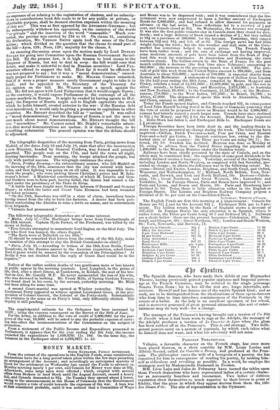The telegraphic despatches of the morning from Paris, giving news
from Madrid, of the dates July 16 and July 19, state that after the insurrection a new Ministry, headed by General Cordova, was formed and actually gaeetted. The people rose on the 17th, and held the town all night, erecting barricades. Next rimming, the troops attacked the people, but only with partial success. The telegraph continues the story. "Paris, Friday Evening.—An extraordinary courier, who left Madrid on the morning of the 18th, announces that the city was covered with barri- cades, and that fighting was going on on all sides. It was impossible to re- strain the people; who were sacking Queen Christina's palace and M. Sala- manca's house. A Ministerial combination, of which M. Isturitz and Gen- eral Cordova were to form part, having failed, the Queen had named a Ca- binet under the presidency of the Duke de Rivas. "A battle had been fought near Granada between O'Donnell and General Blazer; in which the latter and Count Vista Hermosa had been wounded and taken prisoners.
"On the 19th, Barcelona was still in a state of alarm, incendiary bands having issued from the city to bum the factories. A decree had been pub- lished authorizing the Alcaldes to raise a levee en masse, and to exterminate these brigands.
"Valencia had pronounced."
The following telegraphic despatches are of some interest. "Malta, July 17.—The Harbinger brings news from Constantinople of the 12th instant. Captain Hyde Parker, of the Firebrand, was killed by the enemy at Sulina.
"Fire Greeks attempted to assassinate Lord Raglan on the 2d of July. The one who fired was hanged, the others flogged.
"The fleets were at Baltschik on the 10th."
[It should be remarked that letters from the camp, of the 8th July, make no mention of this attempt to slay the British Commander-in-chief.] "Paris, July 21.—According to letters of the 18th from Berlin, Count Nesselrode, in the Russian answer to the Austrian requisition, asked Count Buol if peace would be assured by the evacuation of the Principalities ? At Berlin it was not doubted that the reply of Count Buol would be in the negative."


























 Previous page
Previous page